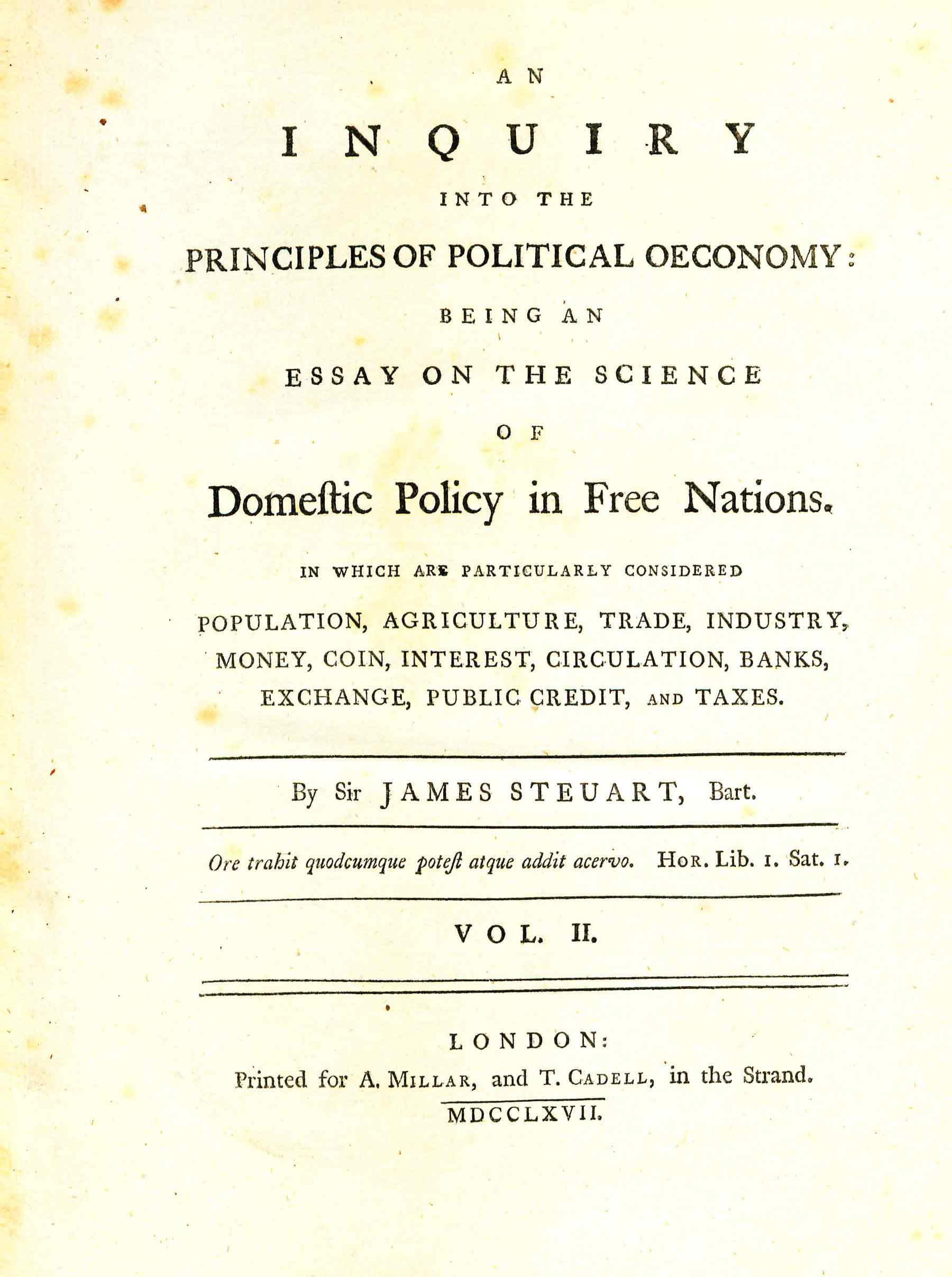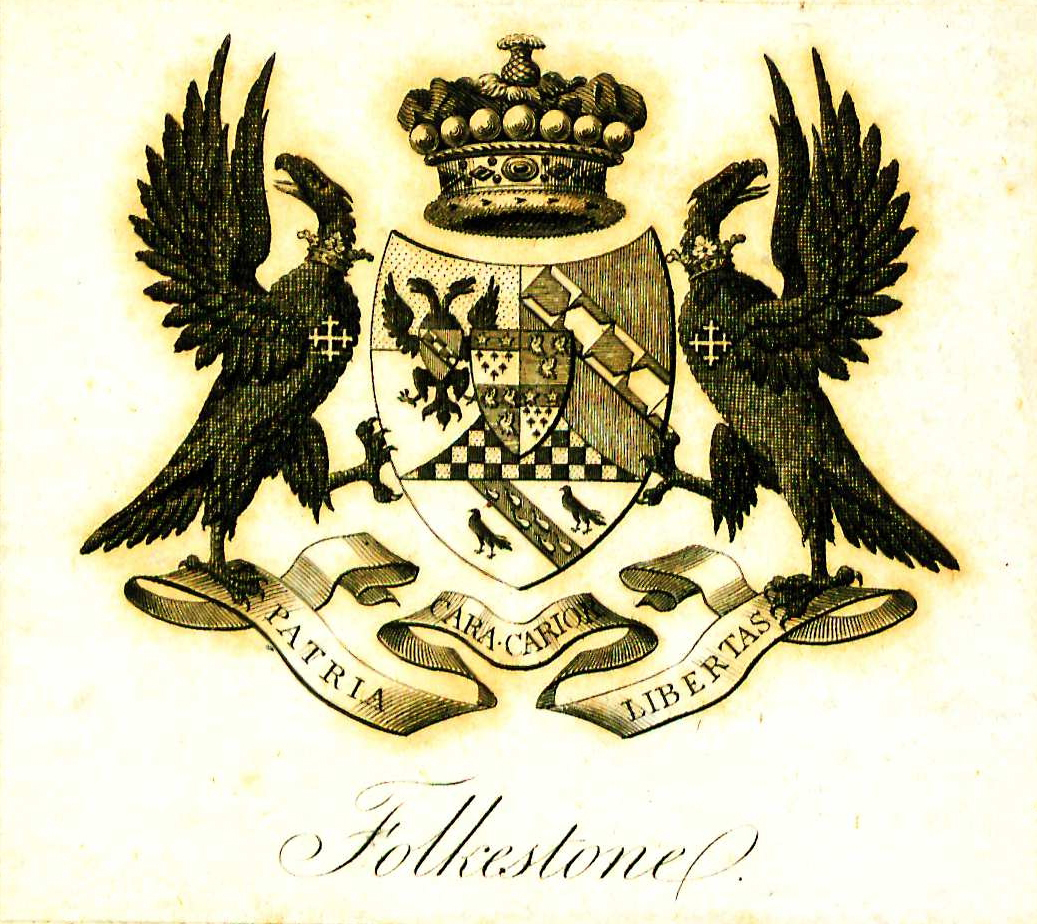Difference between revisions of "Inquiry into the Principles of Political Oeconomy"
m |
|||
| Line 54: | Line 54: | ||
[[Category:George Wythe Collection at William & Mary's Wolf Law Library]] | [[Category:George Wythe Collection at William & Mary's Wolf Law Library]] | ||
[[Category:Titles in Wythe's Library]] | [[Category:Titles in Wythe's Library]] | ||
| − | |||
Revision as of 15:59, 10 March 2018
by Sir James Steuart
| An Inquiry into the Principles of Political Oeconomy | |
|
Title page from An Inquiry into the Principles of Political Oeconomy, volume two, George Wythe Collection, Wolf Law Library, College of William & Mary. | |
| Author | Sir James Steuart |
| Published | London: Printed for A. Millar and T. Cadell, in the Strand |
| Date | 1767 |
| Edition | First |
| Language | English |
| Volumes | 2 volume set |
| Desc. | 4to (29 cm.) |
| Location | Shelf C-4 |
Sir James Steuart (1713 – 1780) was a noted Scottish economist who made exceptional contributions to economic theory. Steuart was considered a pioneer of early economics, and was the first author to use the term "political economy" in the title of a book.[1] In An Inquiry into the Principles of Political Economy he explains the term as:
Steuart wrote from the point of view of a moderate mercantilist. At the time it was published, An Inquiry into the Principles of Political Economy was considered to be the most complete and systematic survey of political economy ever written in England. Some even considered it to be one of the first full-fledged economics treatises to appear anywhere.[3]
Evidence for Inclusion in Wythe's Library
Ordered by Wythe from John Norton & Sons in a letter dated May 15, 1768, "a treatise concerning money-matters, (I think the title is "Of civil oeconomy" written by sir James Stewart ...." Records indicate the order was fulfilled.[4] All four of the Wythe Collection sources (Goodwin's pamphlet[5], Dean's Memo[6], Brown's Bibliography[7] and George Wythe's Library[8] on LibraryThing) list the first (1767) edition as the one owned by Wythe. The title is not listed in Jefferson's inventory of Wythe's Library. The Wolf Law Library purchased a copy of the first edition.
Description of the Wolf Law Library's copy
Bound in contemporary tree calf, rebacked, preserving original gilt spines. Front pastedown includes the armorial bookplate of Folkestone with the Latin motto "Patria cara, carior Libertas" (My country is dear, but liberty is dearer.) Purchased from Donald A. Heald Rare Books.
Images of the library's copy of this book are available on Flickr. View the record for this book in William & Mary's online catalog.
Full text
See also
References
- ↑ Andrew S. Skinner, "Steuart, Sir James, of Coltness and Westshield, third baronet (1713–1780)" in Oxford Dictionary of National Biography, accessed September 26, 2013.
- ↑ Peter Groenwegen, "'political economy' and 'economics'," in The New Palgrave: A Dictionary of Economics (New York: Stockton Press,1998), 3:905, quoting James Steuart, An Inquiry into the Principles of Political Oeconomy: Being An Essay on the Science of Domestic Policy in Free Nations (London: Printed for A. Millar and T. Cadell, in the Strand, 1767), 1:15, 17.
- ↑ Skinner, "Steuart, Sir James."
- ↑ Frances Norton Mason, ed., John Norton & Sons, Merchants of London and Virginia: Being the Papers from their Counting House for the Years 1750 to 1795 (Richmond, Virginia: Dietz Press, 1937), 51-52. The letter is endorsed "Virginia 15th May 1768 / George Wythe / Rec'd ye 8th July / Goods entd. pa: 452 / Ansd. the August 1768 /pr. Woodford."
- ↑ Mary R. M. Goodwin, The George Wythe House: Its Furniture and Furnishings (Williamsburg, Virginia: Colonial Williamsburg Foundation Library, 1958), LIII.
- ↑ Memorandum from Barbara C. Dean, Colonial Williamsburg Found., to Mrs. Stiverson, Colonial Williamsburg Found. (June 16, 1975), 8 (on file at Wolf Law Library, College of William & Mary).
- ↑ Bennie Brown, "The Library of George Wythe of Williamsburg and Richmond," (unpublished manuscript, May, 2012) Microsoft Word file. Earlier edition available at: https://digitalarchive.wm.edu/handle/10288/13433.
- ↑ LibraryThing, s.v. "Member: George Wythe," accessed on March 4, 2014.
External Links
Read volume one of this book in Google Books.
Read volume two of this book in Google Books.

